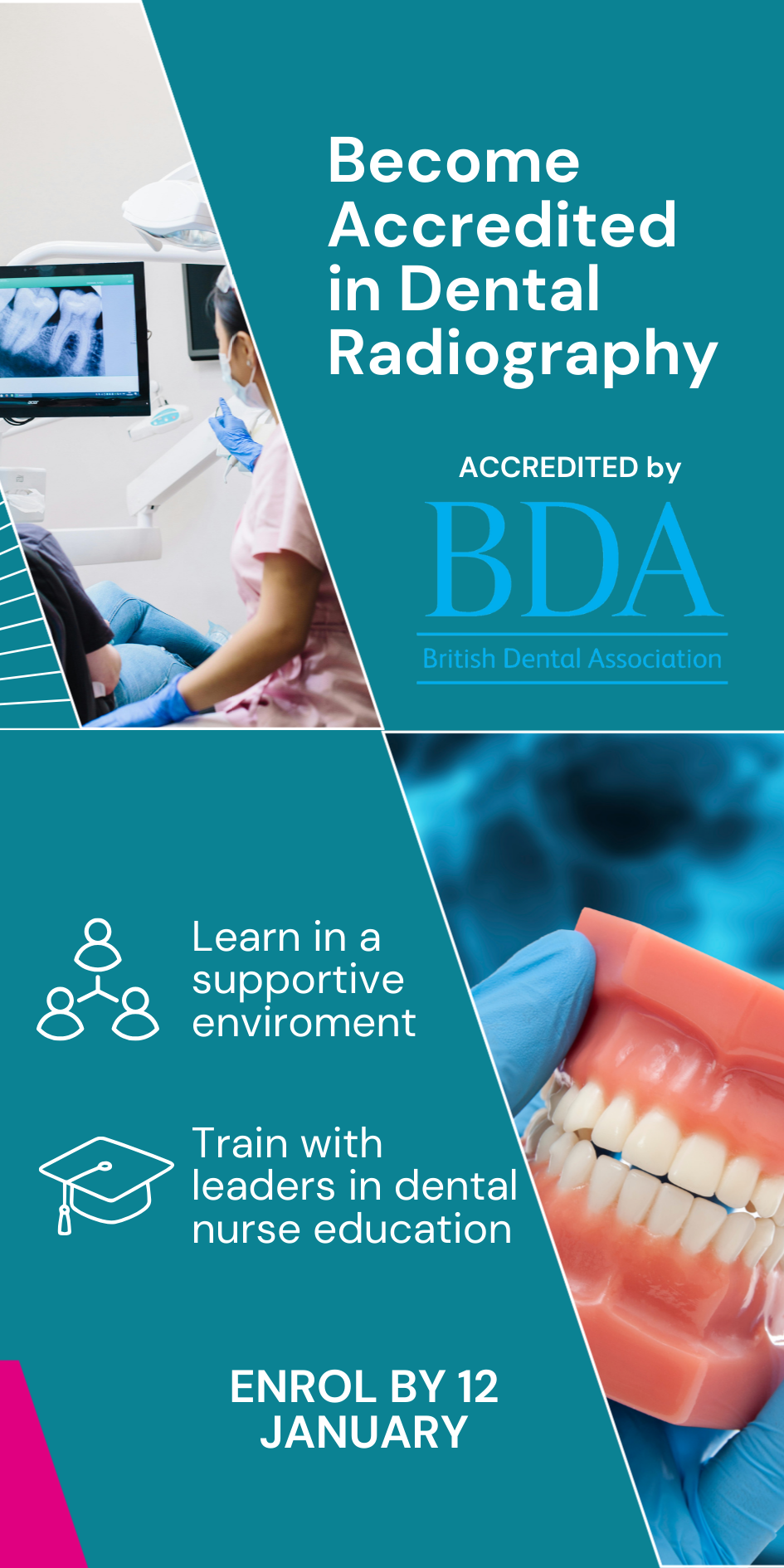 There are numerous opportunities for career progression for dental nurses, with many choosing to pursue careers in dental hygiene and dental therapy (DHT). This article aims to offer insights into this career path and some steps to take to make this transition.
There are numerous opportunities for career progression for dental nurses, with many choosing to pursue careers in dental hygiene and dental therapy (DHT). This article aims to offer insights into this career path and some steps to take to make this transition.
First, it's essential to understand the differences between a dental hygienist and a dental therapist in order to determine which role appeals to you the most.
The General Dental Council (GDC, 2013) defines both roles as follows:
‘Dental hygienists are registered dental professionals who help patients maintain their oral health by preventing and treating periodontal disease and promoting good oral health practice.
Dental therapists are registered dental professionals who carry out certain items of dental treatment direct to patients or under prescription from a dentist.’
The role of a dental therapist encompasses the scope of practice of a hygienist but also involves additional duties such as restorations, pulpotomies, extraction of primary teeth and fitting of preformed crowns. A dental therapist therefore requires a longer training period; a dental hygienist is not able to carry out the restorative work that a dental therapist can without further, formal training. Dental therapists can work privately or on the NHS, whereas dental hygienists predominantly work privately. The GDC Scope of Practice document makes it clear exactly what can and can’t be carried out in both roles and is definitely worth a read if you are unsure. It should also be noted that there are many more training schools offering the dual qualification than the dental hygiene qualification alone; at the time of writing this article, there are twenty training schools across the UK, and six of these offer qualifications in dental hygiene. A full list of up-to-date training schools, along with the qualifications they offer, can be found online published by The British Society of Dental Hygiene and Therapy (BSDHT, 2025) and the British Association of Dental Therapists (BADT, 2025).
A career as a DHT can be hugely rewarding. It is a fantastic opportunity to work in a clinical role, which can significantly improve patients’ oral health and general wellbeing. The role also offers flexibility; as it is possible to work on a full or part-time basis, many DHT roles are self-employed, but there are an increasing number of employed positions becoming available. If you prefer the stability of a salaried position, you can also look into roles within the Community Dental Service, NHS hospitals or the Ministry of Defence.
It is clear why dental nurses make fantastic DHTs, with many training schools preferring to take on applicants with experience of working in practice. Dental nurses already have a good knowledge of dental anatomy and oral conditions, but most importantly, dental nurses are great at communicating with patients and putting them at ease. However, places at training schools are limited and the courses remain notoriously competitive. The following may help to put you in a good position if you are thinking of applying to training schools:
- Shadow a DHT to get an idea of the day-to-day duties to determine if this is something that you can see yourself doing.
- Speak to DHTs about their training. The courses involve a mixture of theory and practical learning, and this can be quite intense, with exams, essays and strict deadlines.
- Consider undertaking further training to increase your scope of practice and patient contact. This looks great on your CV but can also increase your confidence with patients. A few examples of additional duties include oral health, fluoride varnish application, dental radiography and plaque indices.
- Do some research into the training schools, as they can all differ in terms of course length and training style. Also consider the location and what this might mean for you.
- Take a good look at the entry requirements for each training school. Many require GCSEs and A-Levels as well as experience of working in a dental practice. Others accept post-registration certificates. If you don’t have A-Levels, it is possible to undertake an Access to Higher Education course as an equivalent qualification.
You will also need to look into the application deadlines for each training school. Part of the application to university involves writing a personal statement. This is an opportunity to talk about why you would be a great candidate for the course. You will want to give yourself plenty of time to write this along with the rest of your application (UCAS, 2024).
Training to be a dental hygienist or a dental therapist is certainly a great option if you are passionate about the prevention of disease and promotion of good oral health. If you are still undecided, there are plenty of other progression opportunities to look into such as tutoring, practice management and orthodontic therapy.
Written by Melanie Pomphrett RDH, MSc, PGCert
References
BADT (2025). Educational Institutes. Online at: https://badt.org.uk/entry-requirements
BSDHT (2025). Training Schools. Online at: https://www.bsdht.org.uk/training-schools/
GDC (2013). Scope of Practice Online at: https://www.gdc-uk.org/docs/default-source/scope-of-practice/scope-of-practice.pdf
UCAS (2024). Writing your personal statement. Online at: https://www.ucas.com/applying/applying-university/writing-your-personal-statement#:~:text=for%20a%20conservatoire-,The%20personal%20statement%20is%20your%20opportunity%20to%20talk%20about%20you,you%20suitable%20for%20the%20course.


